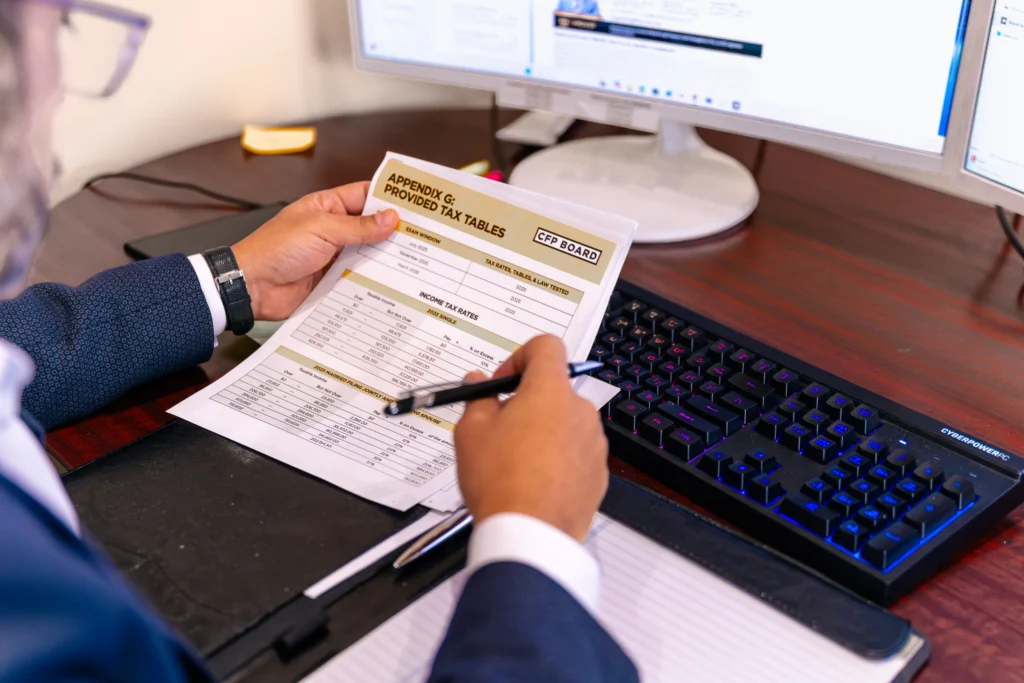Cynthia de Fazio 00:27
Welcome to Retire Smart Austin. My name is Cynthia De Fazio. I’m joined today by Phil Capriatti, senior He is founder and CEO of Empower Wealth and Tax to our viewers at home. This show is all about estate planning today. You don’t want to miss this. This is a very important topic that we’re going to dive into. Phil, how are you today?
Philip Capriotti 00:46
I feel wonderful. How about yourself, Cynthia,
Cynthia de Fazio 00:48
I feel wonderful as well. I always look forward to our shows together. Because obviously, there’s so much information that you share with the viewers at home, people are listening, and they’re tuning in, we get calls from all over. And they’re always fascinated with what you have to share about retirement planning.
Philip Capriotti 01:03
It’s a lot of fun. And the questions that have been coming in lately are, are very unique and original, quite intelligent as well. So last week, we had we had Brad, who was a financial advisor, I absolutely loved that. In fact, there was a lot more information to cover what kind of dip back into that, but not today. Keep watching Brad and I didn’t receive that phone call yet. Pick up the phone and give us a call.
Cynthia de Fazio 01:31
That would be great. Well, obviously today’s topic, though, this is an important one. Because thinking about estate planning, a lot of people wonder, do I need to have an estate plan? What if I don’t have children in my life? So, thoughts on estate planning? Why should people be thinking about that right now, Phil?
Philip Capriotti 01:48
Well, there’s quite a few reasons why. But the first thing I would like to, I would like to say to our viewers, is everyone needs an estate plan. Some estate plans are more detailed than others. But everyone needs an estate plan. So, I’m going to put this out in the beginning of the show, because we only have five spots today. If you have not had your will. Or if you do have an estate plan, have your estate plan checked or reviewed, and the last five years, call in for your complimentary review. We I work with a couple of the finest estate planning attorneys in Texas. And they’ve put themselves out to do complimentary consultations. Wow, yeah, so we can do it by zoom. If you call into the show, and that’s 888-818-6557 Be one of the first five, it’s very difficult to set up an appointment with an attorney that you trust, it’s willing to talk with you and not charge you true. Okay? So, for with that being said, pick up the phone and or hit that QR code, and we’ll be happy to accommodate yourself. What type of individual needs an estate plan? Well, really everybody, but what we’re going to do is we’re going to get into the most severe and what variables should you consider in putting together constructing a comprehensive estate plan. So, the first thing that you want to look at is, first of all, if you are a parent of minor children, you absolutely need to have an estate plan. And not only that, you may need to have a Medicaid plan also baked into that these things are very dicey. Okay. So many times, when these children receive too much income, especially after the death of a parent, we can, we can find ourselves in a situation where they actually lose benefits. So, the number one you want to designate a guardianship, okay for minor children, if something happens to you, who’s going to take over and retain responsibility. The other thing is you want to establish a trust to manage and distribute the assets for the benefit of the minor children. I’ve seen folks who have minor children who may have learning disabilities or other disabilities, and they do not set up a guardianship for these children. It opens these children up to be taken advantage by predators. And what I’m talking about is folks who will you know possibly pretend to be friend them, fall in love with them and what they’re after is the dough so we want to make sure that we protect our children against predators, especially if they’re minor children, or if their children with special donate. So that would be number one variable right out of the red out of the gate. The next thing if you’re a high net worth individual, and you’d be surprised own a business, thriving business, okay, it doesn’t matter if it’s been Canik shop, a body shop, you’re doing a lot of work, I consider these high-net-worth individuals absolutely must have an estate plan. One of the many reasons is you want to make sure that your assets are going to the direction and to the beneficiaries that you designate. But the other thing is you want to make sure that there aren’t estate tax implications that will force your beneficiaries to sell, to sell out to raise capital, excuse me to pay the estate tax, we don’t want to, we want to make sure that we have an estate plan that takes into account all the tax liabilities. So again, if you find yourself in this situation, I don’t care how many millions you have in all in all probability, you have an estate plan. But for some of you who may not or maybe for some of you who have an estate plan, but want a second opinion, please feel free to pick up the phone and give us a call. You may also want to consider any estate plan a trust, okay. There are literally dozens of different types of trusts. There really are. So, we want a trust specifically for wealth preservation, and distribution to our children and potentially grandchildren. Many trusts, in fact, some of these eyelets, and your revocable trust can actually provide income and resources and property for many generations, not not just one or two. So high net worth individuals, you absolutely need an estate plan. If you have a trust or a will, that has not been reviewed in the last five years, please give us a call. Let us set up that complimentary review of your will trust and also your portfolio. I mentioned it I mentioned it briefly all business owners should have an estate plan. Number one, it’s extremely important that you plan for the succession of your business true. Where’s it going to go through? Have you had an evaluation, evaluation of your business? And how will the ownership be transferred? Many business owners and myself included, we get so busy in the day to day operations of our business and our service and what we offer to the general public. Sometimes, you know, it’s like the plumber that has the leaky pipes. All right, absolutely. If you’re a business owner, you call and if you’re too busy, have your bride if you’re married call and, and set up a review and we can explain to you and talk with you. And take a look. By doing a Fact Finder ask you some questions to see exactly what type of trust you may, or you may or may or may not need. But in many cases, you’re going to need an estate plan. And many business owners they don’t think about it. They just don’t.
Cynthia de Fazio 08:31
They’re busy. They’re going on with their day-to-day life. They’re not thinking about what happens if something happens to me, where does the business go?
Philip Capriotti 08:37
Well, they don’t have a Buy Sell agreement set up that’s part of an estate plan, they don’t have a cross purchase agreement set up. There are a lot of different variables that you need, unless you want again to have the tax band, take the larger percentage of your business instead of your family. So, you know, penny wise, don’t be penny wise and dollar foolish. Okay. Last before we go to break is blended families. When you come to a blended family, we also see situations like this now. This happens to be something personal to me, because blended family folks, if you are unaware of what that means, it’s when you’ve been married twice or maybe three times and have children from another marriage example or maybe you’ve married someone who has children, and you have children as well that we consider that a blended family. It can get quite sticky when at the death of the first and then second spouse if we do not have an estate plan in place. Who gets what and why. And you cannot just exclude an individual from your will your estate plan. That’s the surefire way sure fire way of having that A state plan be negated or looking at a lawsuit, you have to at least, if it’s a, if it’s an individual in your family who’s a relative that you don’t really care for, and I’m talking about a child or grant or grandchild, you have to leave them at least $1. So, make the call, it won’t cost you $1 To make the call, call for your complimentary review Tao 888-818-6557. Let’s review your will. That’s part of an estate plan. And let’s see if you actually need a more detailed estate plan, like a trust or something of that nature.
Cynthia de Fazio 10:35
Phil, thank you so much to our viewers at home, that number to call is on your screen 888-818-6557 Or pick up your smartphone and go ahead and click on that QR code at the bottom corner of your screen that will take you right to Empower Wealth and Tax landing page, you can schedule your time with Phil, we know that you have a lot of questions about estate planning, what’s going to happen when you’re no longer here on this planet, you definitely don’t want to miss the opportunity to take advantage of this complimentary consultation 888-818-6557 We have to take a very short commercial break. Don’t go anywhere. We’re talking all about estate planning. We’ll be back with Phil momentarily.
Philip Capriotti 11:14
Most of the folks that we work with are not going to outlive their money. When an individual comes into our firm. The very first question they ask how do I know you’re going to be here five years from now your financial advisor and your licensed fiduciary this should be a lifelong commitment. It shouldn’t be a revolving door exercise generational planning. We have an opportunity to not only work together with retirees, but having my children work with their children, my grandchildren working with their grandchildren. So, we’re establishing a relationship that will literally go through several generations. I have three children that are actively in the business. My youngest son Parker, who’s 22 is a junior trader. He works in our home office in Phoenix with foundations. He’s in a three-year mentoring program. My son Phillip is also a licensed fiduciary he’s 41 years old, he will take over the business and my daughter Lisa, my oldest daughter who’s 42 also has her securities and fiduciary license as well. This company will pass to my children and hopefully someday to my grandchildren, but in the interim, teaching them through my example. That’s our firm.
Cynthia de Fazio 12:45
Welcome back to Retire Smart Austin. My name is Cynthia De Fazio. I’m joined today by Phil Capriatti, senior he is president and CEO of Empower Wealth and Tax. We’re talking all about estate planning. Phil, a great show we’re having today talking about a very important topic estate planning. One of the things I’d like to talk to you next, what about individuals that have special needs children, when it comes to estate planning are there some special things that we should be considering? If we have special needs children,
Philip Capriotti 13:12
I’ve run a note such as several situations where this would apply. And many times, what happens is will and this is what I’ve seen, we’ll have a special needs child. And then we’ll have another child who will take over the reins for that special needs child. In other words, the parents are taking care of the special needs child, but the older daughter or son is going to take over when they are no longer capable or no longer alive. Now in a situation like that, it’s extremely important that you just don’t depend on leaving it to the older child or middle child. You need to set up a special needs trust, okay, we have to provide that child with the proper assets. We want to make sure that dependents with disabilities do not run out of resources. We also want to make sure that the resources they’re receiving do not interfere with their Medicaid benefits. Okay? Many times, if, if it’s not set up property properly, you can jeopardize the eligibility for government benefits. And that would be the last thing we want to do. And I mean, take a look at it. And I’ve talked about this I guess until I’m blue or red in the face. We pay taxes for years and decades and decades. We’re the baby boomer generation. Now we have the new generation wants to come in and just pay me Give me a living wage. Oh, I’m here pay me okay. Yeah, here I am. Okay. Hey, by the way, thanks for all the taxes you paid for the last 50 years. But the fact of the matter is we want to make sure that we wouldn’t don’t want to jeopardize government benefits because we’ve paid into these services. So, if you are a special parent who has a special child, or maybe even a group of special children, we need to set up a special needs trust, in addition to a fiduciary or someone to run it, manage it, and help that individual that you’re leaving in trust to take care of that special needs individual. Extremely important. So, if you find yourself in that situation, please give us a call. We have the resources, and we have the attorneys that handle this. We’ve been we’ve been handling these types of cases for over 20 years. We didn’t just start Okay.
Cynthia de Fazio 15:43
All right. The other question I want to ask you feel sorry to interrupt you, you probably had a train of thought there. When I opened the show. I talked about people that could be in the viewing audience today. Perhaps they don’t have children, people that want to leave money to charities. Can we talk about that for just a moment? What are your thoughts on that with estate planning?
Philip Capriotti 15:59
Yeah, it’s, it’s a great thought. So, you know, you hear me talk about Roth conversion, Roth conversion, tax free retirement planning, and that’s what we specialize in. And we have for the last 20 years, well, just about 19 years, we started the company 2005 If you’re leaving money to charity, and its qualified money, IRA money, okay? Remember, RMDs can be allocated directly to any charity, that’s a 501, C three, they need to have an EIN number, employee identification number, and they need to be a registered charity. We don’t need to leave a check now this with current tax code, we don’t need to leave a charity, a Roth IRA or Roth 401 K, okay. So, depending on if you’re charitably inclined, and many of us are, we can when we when we structure, your retirement income plan, we can say okay, I want this account, which is fully taxable, to go to three charities, 30, charities, that doesn’t really matter, we actually do the completion of the forms to make sure they’re done. We want to make sure the charity is paid directly, but the right funds are paid to the charity. I don’t want tax free funds, going to a charity because of 501 C three as a zero-tax bracket. Okay, they don’t have to file tax returns. And until that tax code changes, folks, again, this is also part of a well-constructed estate plan. Okay, great question.
Cynthia de Fazio 17:38
Let me ask you about couples or just individuals that have significant assets, your high wealth individuals, why is estate planning especially important for those folks?
Philip Capriotti 17:50
Many times, what we want to do is we want to take advantage of the five-year rule, and the uniform gift tax exclusion, which right now is up to 13.8 13 point 9 million, pardon me, it’s going to sunset in the next couple of years. If you have a child or a grandchild or group of children that you want to pass assets on onto, there is nothing wrong with passing them on earlier, whether it be through a quick claim deed or passing the asset over to the to the child. Remember, you can pass assets over to your children. And within five years, if the government can’t reclaim them, if you live for five years, as long as it fits. And it’s a coordinates with the estate tax code and a uniform tax code, what I recommend is we want to get rid of not get rid of pass on as many of these assets before they changed the estate tax code. That makes sense, we want to do it. Now. Remember, these changes are sunsetting within the next three years, and our elected officials are coming after taxpayers, we’re broke. We’re running out of money because of the debt and every single way that they can, that they can harness or Garner tax dollars legally they’re going to implement and again in the name of, of spending down the debt or paying down the debt. So we want to take advantage of little windows or loopholes that are legal in order to pass assets in the estate directly to our children and grandchildren. So, we’re not inadvertently passing them over to the government. Now. Of course, if you want to pass them to the government, you’re free to do so you’re there your assets, but again, have a plan. Sure, have a plan.
Cynthia de Fazio 19:56
it’s down to Well Phil, it’s time for our second commercial Phil and I have a very special offer to our viewers in Austin today. Let’s talk about what that is.
Philip Capriotti 20:04
Folks. Give us a call in addition to the estate planning, which we’re more than happy to help you with. Let’s do a portfolio review. That would be a comprehensive institutional Morningstar report. Let’s see exactly how tax efficient your portfolio is. And let’s take a look at your retirement income plan. And your, as it fits into your entire estate plan. We have five callers and to take advantage of this so dial 888-818-6557 and telling me you saw the show, tell them the name of the show, and asked them to schedule a complimentary consultation. Remember, our consultations normally many times will extend to three separate visits. We ask for no renumeration, or compensation of any sort. We just want to share our knowledge and expertise with you with the possibility of working with you. But again, there’s no requirement to work with us. Just give us a call. Let us say you’re watching and let us know you’d like to get our second opinion.
Cynthia de Fazio 21:13
Phil, thank you so much to our viewers at home, that number to call is 888-818-6557. As Phil mentioned, he has five spots only available this week. This is completely complimentary. There’s no obligation you are not locked in to work with Phil and his group. But let him take a look at what you currently have. Maybe it’s time to make a switch you won’t know until you call 888-818-6557. Or if you have your smartphone handy. Go ahead grab it click on that QR code at the bottom corner of your screen. We’re gonna take a very short commercial break. But I want to ask Phil a question about estate planning when we return that regards people who are very concerned about holding on to their privacy. Stay tuned.
Philip Capriotti 22:14
You know, going back to work after retiring is not ideal. I’m Phillip Capriati, CEO of Empower Wealth and tax if you have amassed a nest egg, it’s time for a financial advisor to help you reach your retirement goals. This is one of the greatest tax windows in history. Now is the time to take advantage of this tax discount while we can we specialize in retirement income planning, tax mitigation, estate planning, and so much more. So, plan your retirement right Call now for your own complimentary portfolio review and tax analysis.
Cynthia de Fazio 22:49
Welcome back to Retire Smart Austin. My name is Cynthia De Fazio and I’m joined today by Phil Capriatti, senior he is president and CEO of Empower Wealth and Tax, and I want to ask him a very important question right now. Phil, I know that you have a lot of high-end net worth clients, if you will, and people are very concerned about maintaining their privacy. So, let’s talk about that people that are very private that don’t want their information shared estate planning, how can we umbrella them?
Philip Capriotti 23:18
See this is one of the many benefits of a trust number one, we do not want our assets to go to unintended beneficiaries. But any of your assets that are in any number of different trusts that are offered maintains your privacy because it totally avoids probate. See when a will is probated, it is out in the public eye. Everyone knows your business. They know what your net worth is. They know what your assets are, parament. They know everything. And many times. Creditors or unintended beneficiaries have a tendency to read the obituary pages, believe it or not, okay to make the claim against the estate. I’ve seen it happen a number of times. So, what we want to do with a trust and again, whether it’s an A B trust, special needs, trust, whatever it happens to be, we want to avoid probate. Because number one, we want our assets to go specifically to the relatives or friends that we designated. But we want it to be done privately, folks, we want it to be done privately. So, most folks should have a trust and having a trust that’s not funded or doesn’t have medical power of attorneys. If you do not have a directive, medical directors, medical power of attorneys, this is something you should be picking up that phone quickly and get this consultation because all of this rolls into proper estate planning. So yeah, we wanted to be private I I want my estate to be private. And most folks out there worked hard, and again paid taxes through their entire lives, their parents paid taxes and worked hard. We don’t want to put our, our laundry or our business in the public domain by not having a trust and being forced to go into probate. Exactly.
Cynthia de Fazio 25:19
Absolutely. What about retirees overall, with estate planning, I know that you specialize, obviously working with folks that are about to retire already retired. How does estate planning tie in for retirees specifically?
Philip Capriotti 25:33
Well, you know, it’s kind of funny, because a lot of retirees, and this is one of the things one of the challenges I’ve had, some folks are afraid to call, especially when you know them, especially when you play golf with them, play tennis with them. Maybe you belong to a group. No one wants you to know their business. And I understand that. When you work with a licensed fiduciary, like myself or anyone that holds a series 65 we are obligated to keep your business completely private. No, we don’t talk about your portfolio or your business to other folks that we play golf or tennis or, or racquetball or what have you. Okay, all of your business folks. It’s like going in if you’re, it’s like going into a confessional, okay? Basically, we are private, all of your businesses are private. We don’t talk to your, our spouses about it. We don’t talk to other advisors about it. We don’t talk to friends or family about it, unless it’s with your specific permission. So, getting into the retirees’ question, distributing retirement accounts after we’re finished, because I think I mentioned this a couple times, many of the folks that we work with, have the resources where they’re not really concerned about running out of money per se, all of their assets or homes are paid off, even if they have multiple homes. What they are concerned is that their what they don’t spend is designated and distributed to their beneficiaries, without with them making it seamless. So, for you, we have to have a distribution plan, not just while you’re alive, but we want a distribution plan after you’re gone.
Cynthia de Fazio 27:30
Phil, thank you so much to our viewers at home most specifically thank you for spending time with us today on this very special episode dedicated to estate planning. Phil has five spots available Don’t miss the opportunity to call in and grab one of those 888-818-6557 or click on the QR code. Be safe. Be happy be blessed. We’ll see you back one week from today. Take care now.





